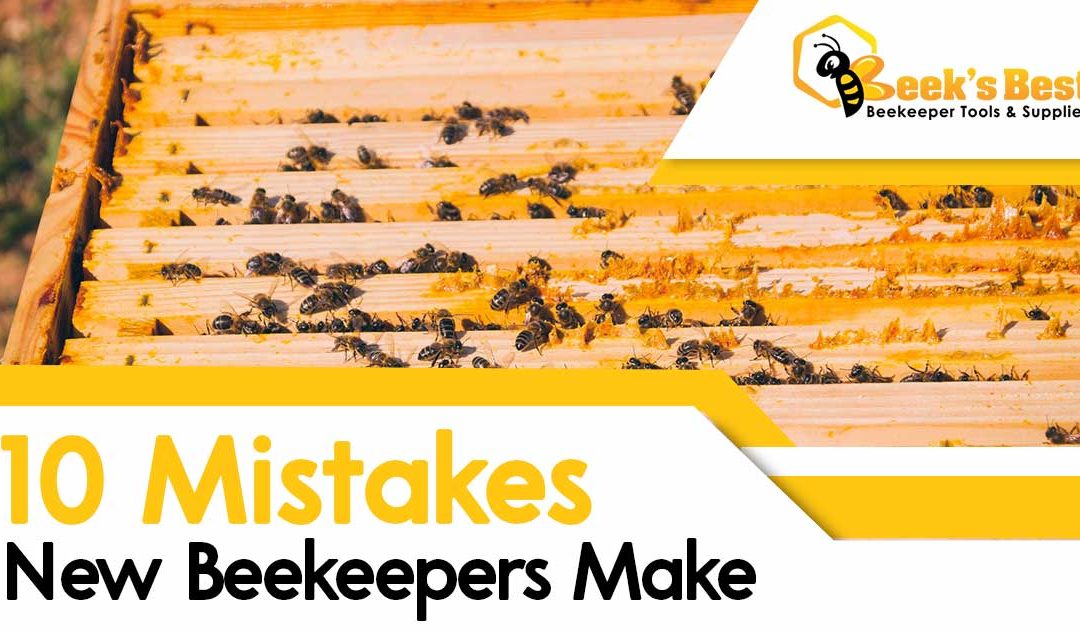Becoming a beekeeper is a great way to give back to mother nature, offer a healthy supply of honey to your customers, and work with the coolest insects on the planet. Along with the perks of beekeeping comes some pitfalls you want to avoid. There are 10 common mistakes beekeepers make when starting out on their beekeeping journey.
For those looking to get started with raising bees, here you will find a list of the mistakes you want to avoid. Learning from mistakes early can really improve your harvest and relationship with your bees early on.
1. Assessment of Colony Health
As beginner beekeepers, the tendency is to focus on harvesting honey and that is good and fine. However, if you don’t pay close attending to the colony health of your bees, the health of your hive could suffer unnecessarily. It’s important you learn how to observe your hive and bee’s behavior from outside the hive.
This can mean observing how many bees come in or out through the day. Observation daily or weekly will tell you if your bees are getting pollen and bring it back regularly. It will also help you notice if other bugs are trying to invade your hive. Bees are self-sufficient yes but early on it’s very important to observe them.
2. Missing the Queen
This is again based on observation. Without the queen, your colony will have a higher degree of collapse. The queen is the primary reason for colony growth and is the only bee that can create worker bees. You will notice a lack of eggs, and your hive will be chaotic because the queen is missing. As long as there are eggs your queen is active.
3. Forgetting to Place Frames Properly
Honeybees will use any free space you give them. That is why Langstroth hives are built the way they are. And come with eight or ten frames. By using fewer frames, you will allow the bees to start building hives that are very hard to manage. This makes things much more difficult for you. Out of the 10 mistakes, beekeepers make this one can be the biggest headache correct.
4. Taking Too Much Honey or Taking Honey Too Soon
Often beginners don’t realize that in the first year the bee’s colony can be very weak. And even though they have honey to harvest the bees need it to survive throughout the colder months. They aren’t quite ready to make extra honey. Conversely, they can make enough honey but then you take too much. Did you know the amount of what you harvest can depend on the geography of where your bees are? Do research on how much you should harvest so you don’t come to your hive and find your bees have starved to death because you took too much.
5. Feed Your New Bees
Buying new packaged bees is a common thing. However, what many new beginners don’t know is that you must feed your bees early on. Packaged bees are weak, confused, and don’t have any honey. You want to feed the new bees for about a month.
6. Location, Location, Location
If you’re not strategic about where you place your bees there can be problems. You want the area to be level, have a large amount of sunlight and ensure that there is plenty of working area for you in case you need to get behind the hive or next to it. Make sure you place the entrance of the hive away from areas where they may be people. Bees need at least 5 feet for going and coming.
7. Using Your Suit Consistently
Ok, this should be a no brainer, but better safe than sorry. Out of the 10 mistakes, beekeepers make this one is the deadliest for you. We have all seen videos or live demonstrations of beekeepers working with no suit. Don’t do this… these beekeepers are experienced, but still, get stung. The temperament of a bee is variable, and the hive can become riled up very quickly. Always wear your protective gear.
8. Your Smoker Is Needed
When working with your bees the smoker disorients the bees from sending signals between each other to become defensive and begin attacking you. It also stimulates them to eat honey because they feel the fire is close and may have to leave. If you don’t use your smoker, they may sting your suit, causing multiple deaths for your bees and decreasing your colony.
9. Only One Colony
When you just start out, it’s helpful to begin with at least two colonies, the reason for this is an improvement in learning, you can use comparison to see the differences on how things are working. It also allows you to boost a week colony by using brood from the strong colony.
10. Not Learning More
This one is a choice several beekeepers fall victim too because of their own reasons. But learning more about bees is fascinating. Sure, you can leave the bees alone, and come check on them once a week but why do the bare minimum. Learning can be fun if you don’t understand something call Beek’s Best at (866) 712-3357 the resources and knowledge offered is second to none.
Conclusion
Starting to raise bees and become a beekeeper is a huge responsibility. However, it’s very rewarding in more ways than one. You will be one step ahead and create very happy and fruitful harvests by avoiding these 10 mistakes beekeepers make.
Beek’s Best has all the equipment and answers to the questions you may have. If you are ready to get started or want some help figuring things out you can reach us at (866) 712-3357. We are here to help.


Recent Comments